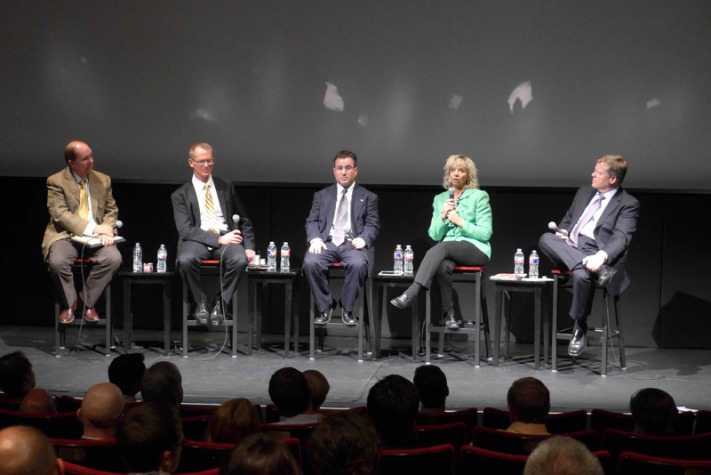Conservatives Cultivate Taste For a Green Tea Party
Tucker Eskew is no stranger to thankless tasks. Eskew was the Republican operative who, in 2008, had the honor of tutoring Sarah Palin on being a vice-presidential candidate. Now, he’s ready to take the heat from fellow Republicans for tackling climate change and championing green energy. Eskew and a crew of fellow conservative green activists brought their mission to Austin yesterday for a lightly attended event. Billed as “a fresh conservative take on energy policy,” the summit attracted about 60 people to the Paramount Theater downtown.
“Remember the saying ‘I was country before country was cool’?” Eskew said. “Some Republicans picked that up and said ‘I was conservative before conservative was cool.’ Maybe one day, we’ll look back on this event and realize we were clean energy conservatives before it was cool.”
The hopeful message is certainly a far cry from today’s “drill, baby, drill!” conservatism. But if the movement—if you can call it that yet—is simply out to swap oil and coal for gas and nuclear, it could be seen as another variation of business as usual. But the speakers seemed eager to break some conservative taboos.
Among the panelists: former Texas Republican state Sen. Kip Averitt, now head of the Texas Clean Energy Coalition; Debbie Dooley, founder of the Green Tea Coalition and national coordinator of the Tea Party Patriots; former six-term Congressman Bob Inglis (R-South Carolina); and Eli Lehrer of conservative think tank R Street Institute.
“What we’re looking for are energy optimists and climate realists,” Inglis said. Though there’s no certainty in climate science, Inglis said, the risks of doing nothing are real. “And what are you going to do in the face of that risk? Proceed pell-mell, or…buy an insurance policy?”
Implacable climate skeptics need to face the political realities, he said. “If conservatives don’t step forward and say, ‘Have we got an idea for you! End all the subsidies [for oil, gas and nuclear], attach all the costs to all the fuels, and watch the free enterprise system sort this all out,’” then Democrats will go forward with their own solutions.
But Republicans face their own political risks for acting on climate change.
“We have a whole boatload of [Texas Republicans] that want to do the right thing, but they have to tip-toe around it. They get timid. They get scared because, quite frankly, they’re afraid of the tea party,” said Averitt, who served as the chair of the Senate Committee on Natural Resources for nearly a decade.
Meanwhile, the fossil fuel lobby maintains its grip in Texas. As a counterpoint to the clean energy confab, the right-wing Texas Public Policy Foundation is hosting its own energy and climate policy summit in Houston this week featuring appearances by GOP ticket-toppers Rick Perry and Dan Patrick. The foundation, which is funded by fossil fuel interests, has been an extraordinarily harsh critic of renewable energy.
“Maybe one day, we’ll look back on this event and realize we were clean energy conservatives before it was cool.” “Renewable energy is unreliable and parasitic,” wrote Kathleen Hartnett White, a former chair of the Texas Commission on Environmental Quality and the head of the foundation’s energy-policy wing, in a 36-page paper she recently released making a “moral case” for fossil fuels. No one in the conservative climate realist camp appears to be on the agenda for the conference this week.
But Dooley says the mood is changing. Some tea partiers, she said, are ready to take a stand, even against Koch-funded front groups like Americans for Prosperity.
“Americans for Prosperity is not tea party,” Dooley said. To combat the Koch party line, conservatives need to change the way they talk about energy.
“Talk about free markets, national security,” she said. “There’s nothing more vulnerable to terrorist attack than our centralized [power] grid. Well, it’s harder to attack rooftop solar.”
Eskew argued that the current frenzy surrounding Uber—the ride-share service that’s operating illegally in a number of cities, including Austin—offers a compelling comparison for how free markets could reshape the energy sector. Eskew compared ride-share services to rooftop solar power. Both pose fundamental challenges to highly regulated, staid industries (taxis and utilities, respectively) but provide direct benefits to the consumer.
“Let’s look at [Uber] from the perspective of the driver, not the consumer. The driver makes a capital expense purchasing the car, then is able to sell back excess capacity into the transportation grid. Isn’t that like solar power?”
For the United States to effectively combat climate change, conservatives will have to make an extremely difficult about-face. Still, the event yesterday hinted at the possibility of such a radical transformation.
Katherine Lorenz, president and treasurer of the Mitchell Foundation, a co-sponsor of the event, was on hand. That’s Mitchell as in George Mitchell, known as the “father of fracking.” According to Lorenz, who is Mitchell’s granddaughter, the current shale boom has temporarily eclipsed his true legacy.
“Despite being in the oil and gas industry and having so many of his peers and colleagues think he was nuts… he was also deeply committed to environmental issues,” she said. “That’s really emblematic of what’s going on with clean energy and the environment today. We need more people to stand up for what they believe, who understand that what the rest of their party, peers and colleagues are saying might not be the right way for the Earth.”


NEWS
Hide Full Index
Show Full Index
View All News